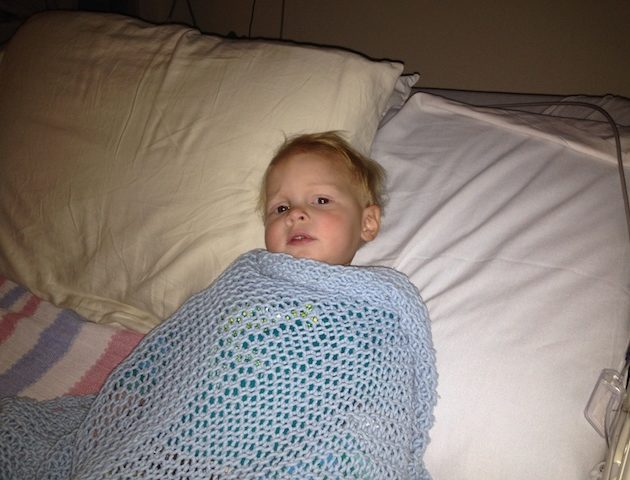
A Goliath Named Neuroblastoma
Jude was afraid of this place, and I could sympathize. I was afraid of this place as well.
This post is part two in an ongoing series of posts about my son Jude and his fight with cancer.
Part 1 – The Day You Find Out Your Child Has Cancer
Part 2 – A Goliath Named Neuroblastoma
Part 3 – “The Tumor Was Not Resectable.”
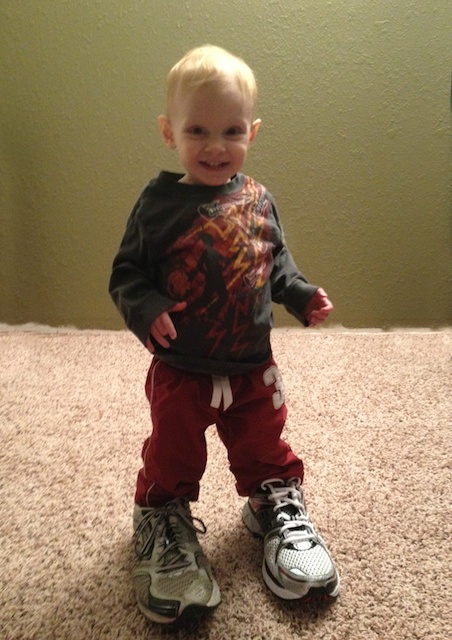 Once the doctors had given us a diagnosis of cancer in our son, Jude, while heartbreaking, it was also oddly reassuring. We had endured over a year of severe gastrointestinal and growth issues with him, and no doctor had been able to determine why. Now we had a diagnosis, and even though it was the embodiment of our worst nightmares, at least we knew now what we were up against. We knew what we were fighting, and we could form a plan.
Once the doctors had given us a diagnosis of cancer in our son, Jude, while heartbreaking, it was also oddly reassuring. We had endured over a year of severe gastrointestinal and growth issues with him, and no doctor had been able to determine why. Now we had a diagnosis, and even though it was the embodiment of our worst nightmares, at least we knew now what we were up against. We knew what we were fighting, and we could form a plan.
For months, it was as if a phantom monster was attacking Jude. We couldn’t see it, but the evidence of its presence was with us always: Jude’s sunken eyes, the bloated, distended belly that made our two-year-old look pregnant, the limp, thin strands of hair, the constant vomiting and diarrhea. Something was obviously wrong. Most doctors seemed to think it was a strange food allergy, some protein that Jude was unable to digest, or some adverse reaction to cellulose that caused his intestinal transit to occur far too rapidly. We had tried all sorts of various diets: gluten free, dairy free, lactose free; and gone through all manner of food and protein supplements. (All of them taste horribly. Trust me.)
Only 30-40% of children diagnosed have a 5 year survival rate, and this is up from only a 10% survival rate a decade ago.But now we had finally seen our Goliath: Neuroblastoma. And what a giant it was. Neuroblastoma is a childhood cancer that grows from immature cells in the nervous system. In Jude’s case, there was a single cell in the adrenal gland that did not mature correctly. This cell began to replicate itself out of control, forming a tumor. While relatively rare (700 children are diagnosed with neuroblastoma every year), it accounts for 15% of all cancer deaths. The survival statistics are pretty grim. Only 30-40% of children diagnosed have a 5 year survival rate, and this is up from only a 10% survival rate a decade ago.
Those first few days in the hospital were slow and tedious. The doctors wanted to do an exploratory surgery as soon as possible to biopsy the tumor, and if at all feasible, remove a portion of it. The problem going forward was that Jude was so weak and dehydrated by this time that the doctors thought surgery would be too risky. So, we spent much of the next week watching bag after bag of fluids being pumped into his body in an attempt to build up enough strength to handle the surgery. It was during this time that so many of our friends (and complete strangers) reached out to us in an incredible outpouring of generosity by way of prayers, encouraging notes, food, and gifts for Jude. We were so blown away by how much love we felt from our church family and our friends. Many times, we simply had to turn off our phones in order to sleep because so many messages and notes were coming in. We received messages of encouragement and prayer from thousands of people, from every continent.
These were long days spent sitting in a hospital room, thumbing through magazines without really looking at pages, grimacing when your child screamed in fear when the nurses came in every 4 hours to draw blood, waiting impatiently to receive the results of the lab reports. Jude was afraid of this place, and I could sympathize. I was afraid of this place as well.
Jude was afraid of this place, and I could sympathize. I was afraid of this place as well.As a two-year-old, he was aware enough to know that he had left the safety and comfort of the home he knew and loved, and had been brought to a strange, sterile place. He was confined to an uncomfortable bed and had mysterious, hurting tubes coming out of his arms and legs. Strangers would enter the room at all hours of the day and night and inflict pain as they drew blood or gave him shots; the parents he thought had loved him would hold him down and repeat over and over, “It’s okay, it will only hurt for a moment.” I can’t imagine the fear or distrust he must have had of the place. I hope he never remembers any of it.
In the corner of the room was a small bay window with a bench seat that converted into a single sleeper bed at night. I made this little area into my own private bedroom, closet, office, and kitchen. I spent many hours, most of those first few days, sitting there, quietly talking to God. Praying, pleading, arguing, begging. I didn’t understand why this was happening to our family. When your child is diagnosed with cancer, your life is quickly reorganized into a new perspective. Nothing else matters; all the possessions you have obtained, the knowledge and skills you have developed, everything else in your life is quickly reduced to trivialities. It’s all worthless, and you’ll trade all of it for the promise of health for your child.
I felt a bit like the Biblical figure of Job. But perhaps that’s giving me too much credit. I wanted to react like Job. As the Old Testament legend goes, when the protective covering of God is lifted from Job’s life, he loses everything. His health, his possessions, his wife, and every one of his children are taken from him, and yet he does not curse God. Despite the fact that he is suffering the cruelest unrelenting agony, he does not accuse God of injustice.
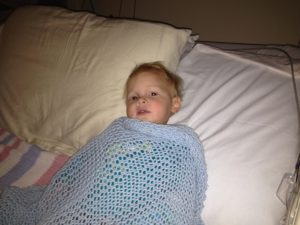
I did not believe that God proactively gave my son cancer. I don’t think God triggers punishment for certain people, even the worst of our species. I did question God though, “Why did you not prevent this? Why, out of all people, did you allow an innocent two-year-old boy to be ravaged from the inside by some hideous hostile malignancy?” I still don’t understand. Thoughtful philosophers and theologians will tell you about the systemic problem of sin and free will, and how it relates to God’s ultimate mercy upon his creation. Sometimes it begins to make sense to me. Often I doubt. But I prayed daily, more often hourly. If God has ever healed someone, I knew he could, and moreover that he should, heal my son. I prayed that my son would live and not die, that he would grow to become healthy and strong, and that he would be an old man before he breathed his last breaths.
After a few days of stabilizing Jude’s body and getting him IV nourishment, we were given the news that surgery was scheduled for Monday, August 6th. The doctors were very clear from the beginning; this was just an exploratory surgery. Despite all the advances of modern radiology and the millions of dollars of technology hospitals have at their disposal, they couldn’t be absolutely sure what they were dealing with until they were physically able to open Jude up and look around. The goal of this surgery was to examine the tumor directly, and to biopsy a tiny portion of the tumor, so that we could get a complete pathology on this particular cancer. If the opportunity presented itself, there was an option of attempting to resect (remove) the tumor. We were cautioned time and again however, the possibility of doing a complete resection was rare. Often, neuroblastoma tumors grow and wrap around other organs and blood vessels, making their removal extremely difficult and risky. Still, we prayed many times every day that the surgeons would be able to remove the tumor, that they would get that damn thing out of my son.
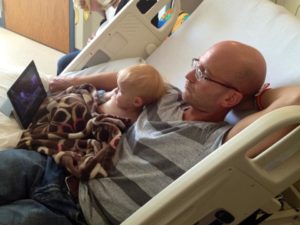 The morning of Jude’s scheduled surgery arrived, and the day was quite surreal, like a stage scene. All of Jude’s grandparents and some of his great-grandparents came and sat with him early that morning. Everyone tried their best to be cheery and encouraging, but behind it all, there was an ashen pallor of dread in the air. Jude, of course, did not know what was coming. In a matter of hours, he would be carried by his mother to another wing of the hospital, whimpering and crying all the way. His grandparents would kiss his forehead and say they loved him very much, and then they would be gone.
The morning of Jude’s scheduled surgery arrived, and the day was quite surreal, like a stage scene. All of Jude’s grandparents and some of his great-grandparents came and sat with him early that morning. Everyone tried their best to be cheery and encouraging, but behind it all, there was an ashen pallor of dread in the air. Jude, of course, did not know what was coming. In a matter of hours, he would be carried by his mother to another wing of the hospital, whimpering and crying all the way. His grandparents would kiss his forehead and say they loved him very much, and then they would be gone.
Standing in the surgical prep room with my 8 ½ months pregnant wife, holding the boy I had loved unconditionally since the moment I learned of his existence, was one of the most unbearable moments of my life. I could not believe that life had brought me to this point. In a few moments, I would be presented with a clipboard, on which were a few sheets of paper I would sign authorizing the hospital and a team of strangers to take my child and cut him wide open. I had not been given any assurances that my son would be fine, or that this was just a routine procedure. It was anything but routine, for all of us involved.
And at last the moment came, when a surgical nurse took from my wife and I our whimpering son, not yet unconscious and full of fear. Hearing his sobs as he was carried away was too much for either of us, and delivered fresh heavy tears to our own eyes, already sunken and bloodshot.
Read part three of this series of posts: “The Tumor Was Not Resectable.”
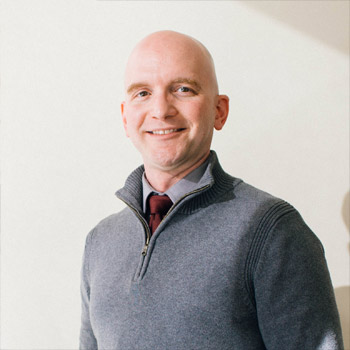 >
>